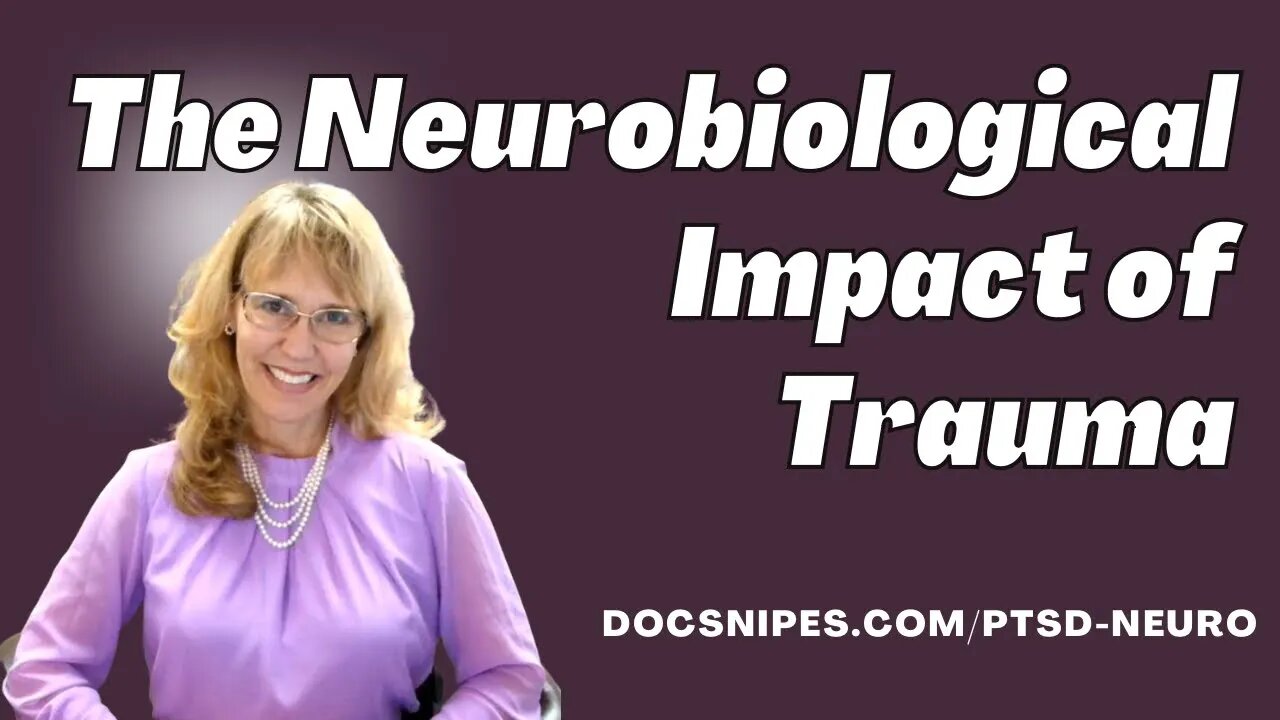Premium Only Content

The Neuroscience of Trauma and Addiction | PTSD & cPTSD Interventions
The Neuroscience of Trauma and Addiction
CEUs are available for this presentation at https://allceus.com
Please SUBSCRIBE & click the BELL to be notified when we release new videos and when Dr. Dawn Elise Snipes is going live.
Access additional benefits by JOINING here https://www.youtube.com/channel/UCAE3JJi8tX7gfhZEXCUGd_A/join
#neuro #traumainformed
Objectives
Define&explain the HPA-Axis
Identify the impact of trauma on the HPA Axis
Identify the impact of chronic stress/cumulative trauma and addiction on the HPA-Axis
Identify symptoms of HPA-Axis dysfunction
HPA-Axis Dysfunction
The body reduces its HPA axis activation when it appears that further fight/flight may not be beneficial. (Hypocortisolism)
In addiction this is often part of tolerance
Hypocortisolism seen in stress-related disorders such as CFS, burnout and PTSD is actually a protective mechanism designed to conserve energy during threats that are beyond the organism's ability to cope.
Dysfunctional HPA axis activation will result in
Abnormal immune system activation
Increased inflammation and allergic reactions
IBS symptoms such as constipation and diarrhea,
Reduced tolerance to physical and mental stresses (including pain)
Altered levels of sex hormones
Low Cortisol and PTSD
Low cortisol has been found to relate to more severe PTSD hyperarousal symptoms.
Glucocorticoids interfere with the retrieval of traumatic memories, an effect that may
Independently prevent or reduce symptoms of PTSD
Or contribute to difficulty treating PTSD
Core neurochemical features of PTSD include abnormal regulation of catecholamine, serotonin, glutamate, amino acid, peptide, and opioid neurotransmitters, each of which is found in brain circuits that regulate/integrate stress and fear responses.
Serotonin (5HT)
Poor serotonin transmission may cause impulsivity, hostility, aggression, depression, and suicidally
GABA has profound anxiolytic effects in part by inhibiting the CRH/NE circuits
May indicate the usefulness of emotion regulation and distress tolerance skills due to potential emotional dysregulation
We need to reduce excitotoxicity in order to reduce distress, improve stress tolerance and enable the acquisition of new skills
The NMDA receptor system has been implicated in synaptic plasticity, as well as learning and memory
Glutamate binds to NMDA receptors. High levels of glutamate are secreted during high levels of stress
Overexposure of neurons to glutamate is known to be excitotoxic, and may contribute to the loss of neurons in the hippocampus of patients with PTSD
Elevated glucocorticoids (Cortisol) increase the sensitivity of NMDA receptors, rendering the brain more vulnerable to excitoxic insults at times of stress.
It may take clients with brain damage from PTSD or addiction more time to master new skills
If the brain becomes excitotoxic during stress, inhibiting learning and memory, then exposure therapies may also be dangerous.
Early adverse experience has profound and long-lasting effects on the development of neurobiological systems, thereby “programming” subsequent stress reactivity and vulnerability to develop PTSD.
The impact of addictive behaviors on the adolescent brain is exaggerated in comparison to that of adults
#trauma #neuroscience #addiction
We, at AllCEUs.com, are an approved education provider for NAADAC, the States of Florida and Texas Boards of Social Work and Mental Health/Professional Counseling,the California Consortium for Addiction Professionals and Professions, the Australian Counselling AssociationCRCC, Canadian Counselling and Psychotherapy Association& more.
Dr Dawn Elise Snipes provides training through AllCEUs.com that are helpful for LPC CEUs LMHC CEUs LCPC CEUs LSW CEUs LCSW CEUs LMFTCEUs CRC CEUs LADC CEUs CADC CEUs MAC CEUs MCAP CEUs NCC CEUS LCDC CEUs CPRS CEUs CTRS CEUs and HPCSA ACA #NBCC counsellors needing counselling continuing education counseling continuing education ceus for social workers social work ceus addiction counselor training counseling ceus continuing education training
NCMHCE addiction treatment, addiction recovery, mental health, anxiety relief, depression, motivation, mental health awareness, addiction awareness and integrated behavioral health approaches to treatment CEbroker CE broker @cebroker lpc ceus lmhc ceus lcsw ceus mental health mental illness
CHAPTERS:
00:00 The Neurological Impact of Trauma and Addiction
00:22 Based on
03:58 Introduction 1
13:15 Introduction 2
22:31 What is The HPA Axis
27:14 HPA-Axis Dysfunction
29:32 Low Cortisol and PTSD 1
31:36 Endocrine Factors
34:16 Neurochemical Factors 1
37:18 Neurochemical Factors 2
37:30 Serotonin Receptors (SOAP BOX)
39:51 Neurochemical Factors (GABA)
41:49 Neurochemical Factors (NMDA Receptors)
43:20 Neurochemical Factors
45:10 Changes? In Brain Structure
46:18 Changes? In Brain Structure 2
47:48 Summary
59:30 Therapy Notes
59:58 Thank You!
-
 52:04
52:04
DocSnipes
1 year agoRevealing How Neurotransmitters Influence Addiction Recovery and PAWS
242 -
 52:47
52:47
Kimberly Guilfoyle
4 hours agoDismantling DEI Once and For All, Live with Tyler O’Neil & Eric Deters | Ep.190
48.6K12 -
 UPCOMING
UPCOMING
Josh Pate's College Football Show
2 hours agoCFP Title Viewership | JP Poll Under Attack | Bama & Oregon Season Grades | Most To Prove In 2025?
60 -
 1:34:59
1:34:59
Redacted News
4 hours agoBREAKING! TRUMP SIGNS ORDER TO RELEASE JFK FILES, CIA IS FURIOUS | REDACTED NEWS
158K266 -
 1:36:09
1:36:09
Benny Johnson
4 hours ago🚨WATCH: President Trump Declassifies JFK, RFK, MLK Files LIVE Right Now in Oval Office, History Now
117K219 -
 LIVE
LIVE
Common Threads
2 hours agoLIVE DEBATE: Will Democrats Roll Over or Fight Back?
117 watching -
 LIVE
LIVE
LFA TV
8 hours agoDonald Trump Sets Israel Up for Failure | TRUMPET DAILY 1.23.25 7pm
500 watching -
 LIVE
LIVE
Sarah Westall
1 hour agoPsychological Warfare, Modern Weapons of War, Panama Canal, Special Ops & more w/ Michael Yon
872 watching -
 46:56
46:56
Chrissy Clark
2 hours agoTrump Responds To Woke Bishop, Cardi B’s TikTok FAIL, & MORE I Underreported Stories
8.69K1 -
 LIVE
LIVE
theDaily302
11 hours agoThe Daily 302 - Colonel Roxane Towner Watkins
122 watching